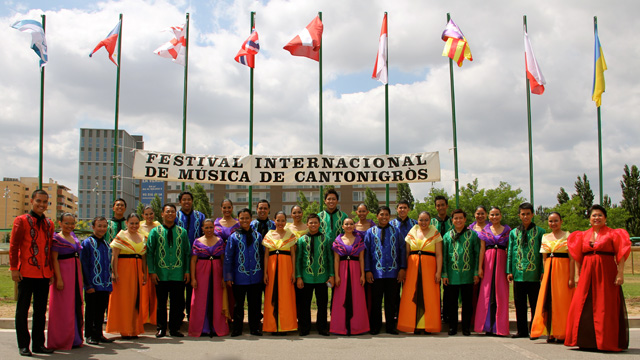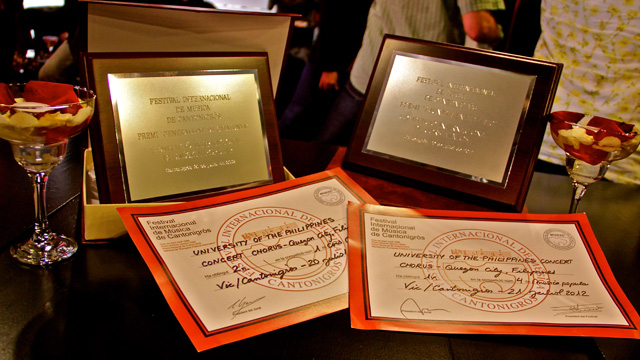SUMMARY
This is AI generated summarization, which may have errors. For context, always refer to the full article.

MANILA, Philippines – When it comes to international singing contests, Filipinos do more than just stand out. And the University of the Philippines Concert Chorus (UPCC) attests to that with their recent victory at the Festival Internacional de Música de Cantonigròs in Spain.
Competing against 42 other chorales from 25 countries from across the globe, the UPCC emerged among the best and bagged two major prizes in two separate divisions in the competition.
Grounded in the belief that music and dance is the universal language that transcends physical and cultural boundaries, the Festival Internacional de Música de Cantonigròs aims to link the world through arts, music and dance. This festival has been arranging yearly confluence of culture and art from across the globe for 3 decades already.
This year’s festival lasted from July 19 to 23 and took place in L’Atlàntida Theatre Vic. UPCC is the only Filipino-composed choir contender that participated in this year’s competition, the other one being the Philippine Normal University Chorale.
Along with Golden-Sail Dance Group from Beijing China and Smikle of Zelzniki Slovenia, UPCC graced this year’s festival in the “Ceremonia de Bienvenida y Apertura del Festival” or the welcoming assembly and opening performances. They also shared the stage with renowned opera singer Maria Bayo and Jove Orquestra Nacional de Catalunya.

UPCC first showcased their talent for the competition in the Mixed Category division where they won second prize and the title “Ajuntament de Vic,” with a 1200€ cash prize. The chorale group competed with choirs from Argentina, Indonesia, Norway, Romania, Spain, Ukraine and Venezuela.
All contenders who participated in the division performed the obligatory piece Madrigal (Cançó de Pere Serafí) composed by Cristòfor B. Taltabull. UPCC also performed Sergei Rachmaninoff’s Bogoroditse Devo Raduisya (Rejoice, O Virgin; All-Night Vigil, Op. 37), John August Pamintuan’s De Profundis and Ruben Federizon’s Gabaq-an.
Standing ovation
Meanwhile, in their next performance for the Mixed Choirs, Male or Female choirs, Folk Music, up to 40 voices division, UPCC bested among 17 chorales and won first prize and the title “Generalitat de Catalunya.” Their winning performance consisted of Beny Castilon’s Kruhay, Arr Eudenice Palaruan’s Pasigin and Rodolfo Delarmente’s Ilay Gandagan. UPCC got to bring home a 600€ cash prize.
Aside from their performances for the competition, UPCC also performed and closed the festival’s “Concert Internacional” and received a standing ovation from the crowd for the rendition of The Beatles’ “Let it Be” And Kirby Shaw’s “One World, One Voice, One Song.”
UPCC also made the finale performance for the last night of the festival in the “Concert Internacional Clausura del Festival” and received their second standing ovation for their performance of “Kruhay,” “De Profundis,” “Eres Tu,” and “Tribute to the King of Pop.”
The UP Concert Chorus is expected to compete next in Hungary and Finland. – Rappler.com
Add a comment
How does this make you feel?
There are no comments yet. Add your comment to start the conversation.